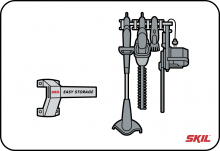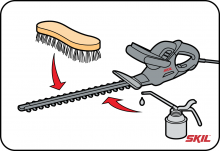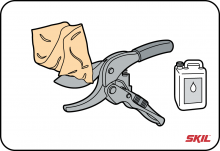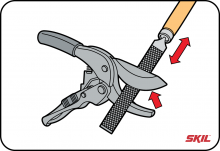-
Stowing your garden tools
Take care when stowing away your garden tools and equipment after use. Some tools can become blunt if they’re left lying on the floor. Sharp tools are safer and easier to use. Make sure all your tools are clean and dry to prevent them from rusting.
Many tools come with special storage systems to be mounted on a wall or stowed in a cabinet. SKIL tools, for example, have the ‘Easy Storage’ design, which allows them to be stowed easily after use without taking up much room at all. You should use these systems, taking care not to place your tools too close to each other. -
Cleaning garden tools
After use, always unplug the tool or remove its battery before thoroughly cleaning it. Brush and wash off any dirt, then rub a little oil onto the tool with a cloth. Regularly lubricate metal with household or metal oil. Grease wooden handles with linseed oil twice a year.
After cleaning, always dry your tools properly to prevent rust forming. If you do see signs of rust in time, you can remove it with fine emery paper. -
Thoroughly cleaning pruning tools
It’s especially important to clean pruning tools thoroughly. That will prevent any bacteria or diseases being transferred from one plant to another plant. Remove resin and sap after every pruning with washing-up liquid or benzine. Next, rub metal oil onto the blades with a cloth and spray moving parts and hinges with loosening oil if desired.
-
Keeping your garden tools sharp
Use the right accessory for every job. For your own safety and convenience, your tools should always be kept as sharp as they can be. Your pruning tools will become blunt if they’re coated with sand or you try to prune branches that are too thick. Replace saws regularly and always sharpen secateurs and loppers with a whetstone or an axe file at the start or end of the season.
-
Taking care of equipment
You should also take good care of your equipment, such as an electric lawn mower or a garden shredder, to avoid unsafe situations. After use, always check your garden equipment for bent, broken or damaged parts. No matter how minor the damage or how fine the crack, be aware that a dangerous situation is always just around the corner. If any garden tools do get broken, don’t try to fix them yourself. Get a pro to take an expert look.





